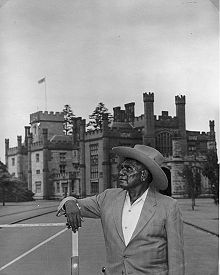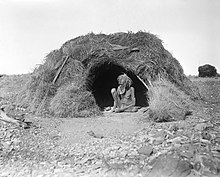Llengua arrernte
 | |
| Tipus | continu dialectal, llengua natural i llengua viva |
|---|---|
| Ús | |
| Parlants nadius | 4.537 |
| Autòcton de | Territori del Nord |
| Estat | Austràlia |
 | |
| Classificació lingüística | |
| llengua humana llengües australianes llengües pama-nyunga llengües aràndiques | |
| Característiques | |
| Sistema d'escriptura | alfabet llatí |
| Nivell de vulnerabilitat | 2 vulnerable |
| Codis | |
| Glottolog | aran1263 |
| ASCL | 862 |
| UNESCO | 168 |
El arrernte o aranda (o més concretament arrernte/aranda superior) és un grup de dialectes parlats a Alice Springs i les rodalies al Territori del nord d'Austràlia.[1] El nom de vegades també s'escriu arunta o arrarnta.
Varietats
[modifica]
Es distingeixen diverses varietats:[2][3]
- Alyawarr (Alyawarra), parlat pel grup Alyawarre
- Anmatjirra (Parlat pels Anmatyerre)
- Antekerrepenhe (Andegerebinha)
- Ayerrerenge (Ayerreyenge)
- Arrernte oriental (Ikngerripenhe) i central (Mparntwe Arrernte; est d'Alice Springs)
- Arrernte occidental (Akarre, Tyuretye Arrernte, Arrernte Alturlerenj; de l'oest d'Alice Springs)
- Arrernte meridional (Pertame, al sud de l'arrernte occidental)
Hi ha debats sobre si aquests són dialectes d'una sola llengua arrernte, o bé diverses llengües separades. L'arrernte inferior, tanmateix, és clarament distint.
Gramàtica
[modifica]L'arrernte té l'ordre de paraules força lliure, però hi ha una tendència a SOV. En general és ergativa, però és acusativa en els seus pronoms. Els pronoms poden ser marcats per dualitat i grup de pell.[7]
| Sufix | Glossa |
|---|---|
| +aye | èmfasi |
| +ewe | èmfasi més forta |
| +eyewe | èmfasi encara més forta |
| +ke | per a |
| +le | actor en una frase |
| +le | instrument |
| +le | ubicació |
| +le-arlenge | junt, amb |
| +nge | de |
| -akerte | tenint |
| -arenye | de (origen), associació |
| -arteke | semblança |
| -atheke | cap a |
| -iperre, -ipenhe | després, de |
| -kenhe | pertany a |
| -ketye | perquè (conseqüència dolenta) |
| -kwenye | no tenint, sense |
| -mpele | mitjançant, via |
| -ntyele | de |
| -werne | a |
| +ke | passat |
| +lhe | reflexiu |
| +em | present |
| +rre/+irre | recíproc |
| +tyale | imperatiu negatiu |
| +tye-akenhe | negatiu |
| +tyeke | propòsit o intent |
| +tyenhe | futur |
| ∅ | imperatiu |
Pronoms
[modifica]La declinació dels pronoms es fa en nominatiu més que en ergatiu.
| Persona | Número | Subjecte | Objecte | Datiu | Possessiu |
|---|---|---|---|---|---|
| 1 | Singular | ayenge | ayenge/ayenhe | atyenge | atyenhe/atyinhe |
| Dual | ilerne | ilernenhe | ilerneke | ilernekenhe | |
| Plural | anwerne | anwernenhe | anwerneke | anwernekenhe | |
| 2 | Singular | unte | ngenhe | ngkwenge | ngkwinhe |
| Dual | mpwele | mpwelenhe | mpweleke | mpwelekenhe | |
| Plural | arrantherre | arrenhantherre | arrekantherre | arrekantherrenhe | |
| 3 | Singular | re | renhe | ikwere | ikwerenhe |
| Dual | re-atherre | renhe-atherrerenhe-atherrenhe |
ikwere-atherre | ikwere-atherrenhe | |
| Plural | itne | itnenhe | itneke | itnekenhe |
Les parts del cos normalment requereixen pronoms no possessius (possessió inalienable), encara que alguns parlants més joves utilitzen possessives també en aquest cas.[15]
Llengua de signes
[modifica]Els arrernte tenen una llengua de signes molt sofisticada.
Arrernte a l'escola
[modifica]
A la majoria de les escoles primàries d'Alice Springs, tots els estudiants aprenen arrernte (o en alguns casos arrernte occidental) de manera obligatòria, sovint al mateix temps que el francès o l'indonesi. A més, la majoria d'instituts de la ciutat ofereixen l'opció d'estudiar l'arrernte com a assignatura separada. Es planeja incloure'l també a les universitats.
Arrernte a la feina
[modifica]Moltes càrrecs a Alice Springs requereixen que els empleats adquireixin com a mínim coneixements bàsics d'arrernte per poder comunicar eficaçment amb les persones arrernte, que son moltes. Alguns empreses també ofereixen cursos sense cost.
Notes
[modifica]- ↑ Laurie Bauer, 2007, The Linguistics Student's Handbook, Edinburgh; also /əˈrændə/ «Aranda». A: Oxford English Dictionary. 3a. Oxford University Press, Setembre de 2005.
- ↑ Dixon, R. M. W.. Australian Languages: Their Nature and Development. Cambridge University Press, 2002, p. xxxix.
- ↑ Bowern, Claire. 2011. "How Many Languages Were Spoken in Australia?", Anggarrgoon: Australian languages on the web, 23 desembre 2011 (corrected 6 febrer 2012)
Referències
[modifica]- Breen, Gavan. Introductory Dictionary of Western Arrernte. Alice Springs: IAD Press, 2000. ISBN 978-0-949659-98-9.
- Breen, Gavan. «The wonders of Arandic phonology». A: Simpson, Jane. Forty Years On: Ken Hale and Australian Languages. Canberra: Pacific Linguistics, 2001, p. 45–69.
- Breen, Gavan; Dobson, Veronica «Illustrations of the IPA: Central Arrernte». Journal of the International Phonetic Association, 35, 2, 2005, pàg. 249–254. DOI: 10.1017/S0025100305002185.
- Breen, Gavan; Pensalfini, Rob «Arrernte: A Language with No Syllable Onsets». Linguistic Inquiry, 30, 1, 1999, pàg. 1–25. DOI: 10.1162/002438999553940.
- Dixon, R. M. W.. Australian Languages: Their Nature and Development. Cambridge: Cambridge University Press, 2002. ISBN 978-0-521-47378-1.
- Green, Jenny. A learner's guide to Eastern and Central Arrernte. Alice Springs: IAD Press, 2005. ISBN 978-1-86465-081-5.
- Henderson, John. Topics in Eastern and Central Arrernte grammar, 1988.
- Henderson, John; Veronica Dobson. Eastern and Central Arrernte to English Dictionary. Alice Springs: IAD Press, 1994. ISBN 978-0-949659-74-3.
- Henderson, John. «The word in Eastern/Central Arrernte». A: R. M. W. Dixon. Word: A Cross-Linguistic Typology. Cambridge: Cambridge University Press, 2003, p. 100–124.
- Ladefoged, Peter; Ian Maddieson. The Sounds of the World's Languages. Oxford: Blackwell Publishers Ltd, 1996. ISBN 978-0-631-19815-4.
- Mathews, R. H. «The Arran'da Language, Central Australia». Proceedings of the American Philosophical Society, 46, 187, 10-1907, pàg. 322–339.
- Strehlow, T. G. H.. Aranda phonetics and grammar. Sydney: Oceania Monographs, 1944.
- Wilkins, David P. «Switch-reference in Mparntwe Arrernte (Aranda): form, function, and problems of identity». A: Austin, P. K.. Complex sentence constructions in Australian languages. Amsterdam: John Benjamins, 1988, p. 141–176.
- Wilkins, David P. Mparntwe Arrernte (Aranda): studies in the structure and semantics of grammar, 1989.
- Wilkins, David P. «The semantics, pragmatics and diachronic development of "associated motion" in Mparntwe Arrente». Buffalo Working Papers in Linguistics, 91, 1991, pàg. 207–257.
- Yallop, C. Alyawarra, an Aboriginal language of central Australia. Canberra: Australian Institute of Aboriginal Studies, 1977. ISBN 978-0-85575-062-6.
